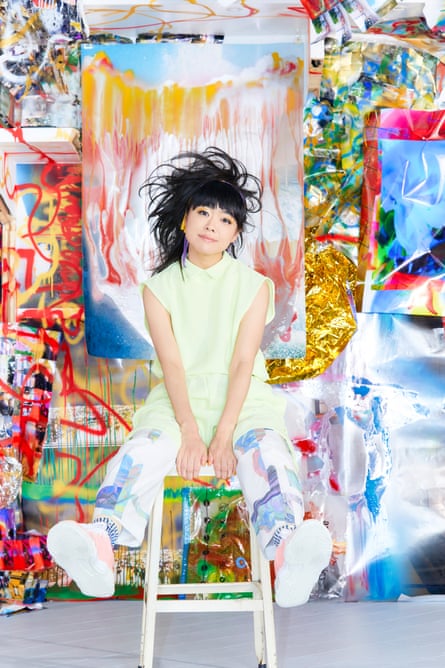There aren’t many jazz performers like Japanese pianist Hiromi Uehara. With her hair artfully piled almost a foot above her head, the 44-year-old launches into muscular assaults that traverse everything from fast-paced bebop to contemporary classical, monumental power chords and prog-fuelled excursions on the synth: a maximal sound that brings crowds to their feet, whooping instead of the usual respectful applause of the jazz club.
“My audience is so wide-ranging; I remember a recent show in Italy where there was a very well-dressed older woman in pearls on the front row and next to her was a guy in an Iron Maiden T-shirt,” she says with a laugh. “Further along there was a seven-year-old kid who I could tell was learning the piano.”
Video calling from a grey hotel room in Stanford, California, where she is due to play in the evening before embarking on a global tour – she reaches London jazz festival later this month – Hiromi is softly spoken (in contrast to her music), explaining how her formidable stage presence was born out of a depressing necessity.
“I moved to the States to study in 1999 and that was the first time I realised that some people might think Asian people all looked similar,” she says. “I remember playing a concert and afterwards a man came up to my Asian friend and complimented her for the performance. We looked nothing alike but it happened a lot. I decided that I needed a look that people could tell was Hiromi.”
Now 20 years on from her ensuing debut album, Another Mind, which was produced by her mentor Ahmad Jamal, Hiromi has developed much more than just a look to distinguish herself from her peers. She won a Grammy in 2011 for her work with bassist Stanley Clarke and has released 12 records that span intricate trio compositions, chamber jazz and a film score for 2023’s anime Blue Giant. She even had brief renown as a jingle writer aged 18, composing for a Nissan advert starring Mr Bean.
As one of the few female bandleaders in a heavily male-dominated genre, Hiromi says she has grown to relish the subversion of expectations. “I remember playing Toronto jazz festival in 2003 when I was 24 and as I came out on stage, I could sense that people were confused because I’m very short for an American standard and I looked young,” she says. “People were thinking, what’s this little girl doing on the stage? And I could really feel that. But none of it mattered as soon as I hit the first note. People loved it and I have always loved the challenge of changing their minds.”
Her latest record, Sonicwonderland, upends expectations once more. A stark contrast to the acoustic piano and string quartet backing of 2021’s Silver Lining Suite, Hiromi plays squelching funk keys and squealing synths, backed by a new, young band of improvisers. Over its nine tracks, spanning the synths and slap bass of the title track to the Latin jazz freneticism of Up, Sonicwonderland is perhaps the closest thing to Hiromi’s onstage exuberance.
She wrote it just after the restrictions of the pandemic, “and I just felt so much freedom,” she says. “I was playing around with the keyboard, doing all the things you can’t do on acoustic piano, since I wanted to express every aspect of myself. It seemed that other people were doing the same too – audiences were free to go crazy at shows and I wanted to keep inspiring that feeling.”
That love of an audience’s unpredictable energy began early. Taking piano lessons from four, Hiromi was soon introduced to jazz and by the age of 12 she was travelling to Taiwan to play her first show abroad. “It gave me the desire to perform all over the world because I realised that music doesn’t have borders. I could connect to people who I don’t share a language with,” she says, leaning in. “The piano was like a plane, it could take me anywhere.”
after newsletter promotion
Indeed, she went on to play at the UN and with the Czech Philharmonic when she was 14, and by 17 a chance encounter with pianist and Miles Davis collaborator Chick Corea led to an invitation to play at his show in Tokyo the following night. A decade later, the pair would release a live album, Duet. “That was my dream moment,” she says with a smile. “When he said we’d make a record I remember closing the door of his dressing room and running 200 metres just screaming!”
Reflecting influences from Corea to Frank Zappa and funk fusion, Hiromi is resolved to following her own path. “I just want to keep exploring and trying new things,” she says. “Like Ahmad Jamal said, ‘my best album or performance is going to be my next one.’” And with that, it’s time for Hiromi to don her stage hair, ready to surprise another crowd.

